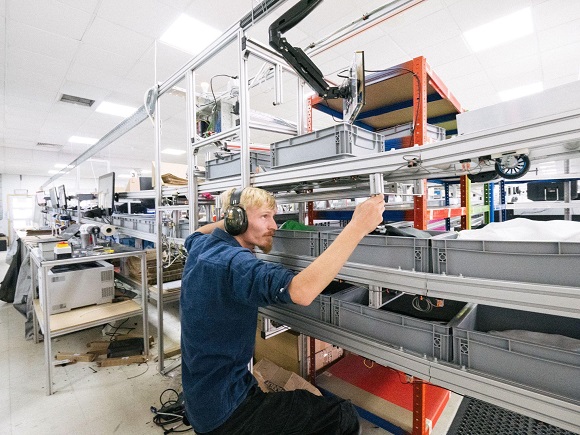Circular IT series - Teemill: Collaborative Saas platforms are transforming the concept of 'waste'
This is a guest post for the Computer Weekly circular economy series attributed to Sofia Voudouroglou of Teemill, an open access enterprise software platform that allows businesses to access circular economy technologies and create sustainable products on demand.
Voudouroglou writes as follows…
Remember when sustainability used to be for hippies?
It didn’t take long for what always was a systemic issue to start reaching a new level of awareness in all corners of the global economy. The conversation started with our hardware, which is mostly dumped, making up 70% of toxic waste – that’s 50 million metric tons of electronics sent to landfill every year.
Tech people are meant to be clever people, but that system is stupid and getting worse. At the same time we are not all hippies… and even if we were, we could still use logic to find a solution. When we are talking about waste, we’re talking about materials – and materials are worth something. In E-waste, the world’s most valuable materials are thrown away after only a few months of use so our proposal is to turn that linear conveyor belt of take, make, waste and bend it round into a circle so products come back to be remade.
This is not an original problem. The second most polluting industry in the world is textiles – the stuff we are wearing.
Some 56 million tonnes of clothing are purchased globally every year. 60% of clothing is made from plastic and less than 1% of textile waste is recycled – the rest goes to ‘waste processing facilities’ – in plain language, that means a lorry load is burned or buried per second. If products are produced speculatively and designed to be thrown away, scaling overproduction up to mass production means massive amounts of waste.
Can’t software fix all this?

Voudouroglou: Every problem has a solution.
If we can rethink what waste means, here’s a new way to look at a company. A company makes products to solve problems and is rewarded for profit, so the scale of the problem is also the scale of opportunity. If our entire system is built on a linear model and the circular economy is the solution, soon there will only be two types of companies: Those doing it… and those that went bust.
They’re going to need some enterprise software for that.
“Everywhere there is waste, there is opportunity.” – Mart Drake-Knight, Teemill co-founder.
The software industry has a pretty good track record of solving problems cheaply and efficiently. Conversation starter though: are the priorities right, or did we really need to solve whatever TikTok solved more than a solution for climate? We’d like to see more companies identify the synergies in software and sustainability. Also, we’d like to contribute an example or two.
We decided to use tech to solve the t-shirt industry. It’s a fairly complex problem across a dynamic supply chain that covers robotics, automation, machine learning, and sharing it with others via APIs, 3PL / enterprise fulfilment software or our free platform & app. There’s a jumble sale of computing words there, so bear with, as a vision of the future will emerge.

Inside the Teemill factory, where Raspberry Pi-powered machinery controls the printers, energy output and order scheduling.
The nature of the problem is that things are designed to be thrown away creating a high volume of low-value waste. Processing and recycling takes a lot of manpower, energy and time making it cheaper to pollute than not. It’s the economic equivalent of fighting gravity. Impossible. But then someone invented a technology called aeroplane and now it’s no big deal.
We know that 40% of clothing production is never utilised, which means it’s made and then binned without ever really being worn. We started by buying an old supermarket and writing the code we needed to make a super efficient fulfilment centre that enabled us to produce tees (T-shirts) in real-time. Clothes are normally produced speculatively and doing that produces lots of waste, but not doing that saves lots of money. We then used the money we saved to solve other problems. We designed every product with a QR code inside it to activate a freepost return process.
We use the material we recover to make new products and give customers money off their next order. That saved on material cost and keeps customers returning, and the
money we saved means we can afford to use natural materials, renewable energy and plastic free packaging.
Problem shared = solution doubled
Digitising the solution has one really big upside; it can be scaled and shared easily.
So we packaged up all our technology with some other software we made and give away access to it online. We share our production technology with other factories that want to operate more sustainably, streamline and cut costs in their on-demand order fulfilment and print-on-demand facilities. Startups, brands, businesses and events use our online store-builder technology to set up their own ecommerce stores connected to our factories, starting their business sustainably on day one. Sometimes people just order custom t-shirts for fun online.
What matters is that whether the end user realises or not, these are carbon neutral, natural and sustainable products not destined for landfill – they’re designed to come back and be remade so the material stays in use.
The cool thing about sharing technology is the unexpected outcomes and the innovative ways things are used. A small team might use Teemill to make some custom circular t-shirts, and start a conversation in their organisation about circularity. It might lead to a systems team realising this could solve their entreprise level fulfilment problem and save money. Someone might take it home from work and make some cool designs with their kids. Those kids might go on to change the world in new ways we cant even imagine.
“People say competition is the solution for everything, but in reality we’ve got much further, much faster with cooperation.” – Mart Drake-Knight.
In the crisis-of-everything age, it’s easy to forget that every problem has a solution.
Hopefully this is a reminder of what moving forward might look like.
And Greta, if you’re reading, we think you should totally get into computing.




